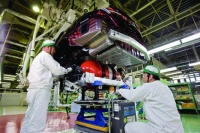
Ted Roberts, senior lecturer at the School of Chemical Engineering and Analytical Science, will guide an investigation into hydrogen PEM fuel-cell catalysts to determine how their design affects performance.
’My view at the moment is that the catalyst layer is essentially a random structure,’ he said. ’What I would like to be able to do is control that structure so it’s not random, to see whether it can not only give improved performance but also explain how those structures work.’
This information could lead to a radically redesigned catalyst layer for hydrogen PEM fuel cells.
Roberts explained that a typical PEM fuel-cell catalyst consists of spherical particles of carbon with nanometer-sized platinum catalyst particles on the surface. ’Then there is a layer – well, the theory is that there’s a layer – of electrolyte that sits over the surface of those particles,’ he said.
His group will test an alternative to this structure. Roberts said that the group’s catalyst layer will be designed with large porous structures of carbon. ’The particles of carbon will have pores running through them and those pores could be either for allowing the gas to go through or being filled or coated with electrolyte,’ he said.
Roberts noted that there is some porosity in the carbon particles of current catalyst layers, but the role of its porosity is unclear and there is no way to tell if it is the right pore size.
The catalyst layers will be made in a carefully controlled structure in Manchester University labs and then sandwiched in a membrane electrode fuel-cell assembly. The cells will undergo experiments that will look into important factors relating to the catalyst layer, such as nitrogen absorption, surface area and pore-size distribution, and electrochemical activity.
Roberts said that the fuel cells’ performance will be examined using a hydrogen/air PEM fuel-cell test stand. ’If we can design a structure so it could give a step change in performance, that will obviously be a large achievement,’ he said.




Poll: Should the UK’s railways be renationalised?
I think that a network inclusive of the vehicles on it would make sense. However it remains to be seen if there is any plan for it to be for the...